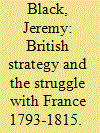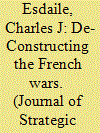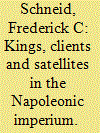|
|
|
Sort Order |
|
|
|
Items / Page
|
|
|
|
|
|
|
| Srl | Item |
| 1 |
ID:
082805


|
|
|
|
|
| Publication |
2008.
|
| Summary/Abstract |
This article examines the various constraints under which the conduct of British strategy operated during the French Wars - examples include its political and geographical situation, its far-flung colonial interests and its limited military resources and its need to maintain a strong alliance system in continental Europe - and shows how the direction that it took closely mirrored a variety of campaigns in the eighteenth century. That said, the position in which Britain found herself in the struggle against the French Revolution and Napoleon was frequently contradictory, and it is no coincidence that it was some time before the ideal combination of strategies was found that marked the period 1808-14. The fact that the difficulties involved were overcome said a great deal for the underlying strength of the British state.
|
|
|
|
|
|
|
|
|
|
|
|
|
|
|
|
| 2 |
ID:
082804


|
|
|
|
|
| Publication |
2008.
|
| Summary/Abstract |
The Emperor Napoleon I is regarded as one of the greatest generals of all time and, as such, he has attracted an immense bibliography. In spite of this, there have been few studies of him as a strategist: instead, it is simply assumed that it was enough for the Emperor to have conducted an operation for it to have had a logical strategic goal. In this article, however, Napoleon is shown to have been primarily an opportunist, who was frequently guided by the needs of the moment and swayed from his course by circumstance, while it is further suggested that, even considered on their own merits, many of his decisions were faulty in the extreme
|
|
|
|
|
|
|
|
|
|
|
|
|
|
|
|
| 3 |
ID:
082806


|
|
|
|
|
| Publication |
2008.
|
| Summary/Abstract |
Napoleon shaped his Empire with the expansion of dynastic possessions, the cultivation of princely clientele and the establishment of satellite and allied states. He built his imperium on the foundation of historic French relationships. This expansion began with the Revolutionary Republic and achieved its fullest extent under the Empire. Expansion was not pursued as a universal principle, but instead, each state became a part of a grand strategic objective related to respective enemies. In some cases, states served as buffers between France and their immediate enemies, but shortly thereafter served a dual role as offensive and defensive components of the Republic, and later Napoleonic Empire.
|
|
|
|
|
|
|
|
|
|
|
|
|
|
|
|
| 4 |
ID:
082808


|
|
|
|
|
| Publication |
2008.
|
| Summary/Abstract |
In 1955 British Operational Research (OR) analysts attached to the British Army conducted a hypothetical study of the likely impact of nuclear weapons as they might have been deployed by Anglo-French forces in resisting the German invasion of North-East France in May-June 1940. The study formed the first major attempt by OR analysts to assess the use of nuclear weapons at the tactical level. In deriving lessons from 1940, OR analysts focused on several battlefronts where nuclear weapons could have provided relief to defending forces. Consideration was also given to a situation where the invading forces were also nuclear-equipped. As this paper demonstrates, valuable insights were gained from the events of 1940 on the deployment of battlefield nuclear weapons. However, in neglecting the wider strategic environment, OR analysts failed to consider the possibility that a nuclear land battle fought in Europe between the North Atlantic Treaty Organisation and the Warsaw Pact could precipitate a strategic nuclear exchange
|
|
|
|
|
|
|
|
|
|
|
|
|
|
|
|
| 5 |
ID:
082807


|
|
|
|
|
| Publication |
2008.
|
| Summary/Abstract |
This essay re-examines coalition warfare during the Napoleonic era by looking at the three eastern European powers - Austria, Prussia and Russia - how they interacted over time with France as well as each other, and how they managed French preponderance on the Continent. Before 1812, coalition warfare was dominated by eighteenth-century military and diplomatic attitudes: overall foreign political goals were ill-defined and were characterised by deep mistrust. The result was that the eastern powers pursued their own interests with little regard to coalition cohesion. If the coalition held together in 1813 and 1814, on the other hand, it was largely because individual powers' self-interest coincided with the overall objectives of the coalition - an increased determination to defeat Napoleon - along with a never before seen numerical superiority in allied troops. In this, Austria and especially Chancellor Metternich's role in juggling conflicting interests between the allies so that they could present, for the first time, a united front against France was fundamental.
|
|
|
|
|
|
|
|
|
|
|
|
|
|
|
|
|
|
|
|
|